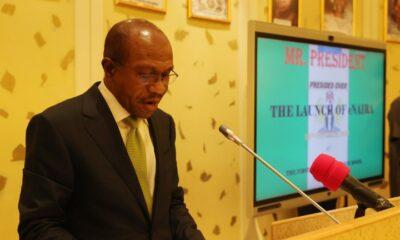Nigeria is poised to witness a monumental shift in its economic landscape as the highly anticipated Dangote Refinery and Petrochemicals commence operations.
This game-changing development is expected to result in a staggering savings of approximately N35 trillion in fiscal expenditure over the next five years.
The Governor of the Central Bank of Nigeria, Godwin Emefiele, made this revelation during the inauguration ceremony of the Dangote Petroleum Refinery and Petrochemical facility in Ibeju-Lekki, Lagos. This colossal refinery, boasting the title of the world’s largest single-train petroleum refiner, has captured the attention of both domestic and international stakeholders.
President Muhammadu Buhari, who officiated the inauguration, expressed his administration’s commitment to fostering public-private partnerships. He hailed the Dangote Refinery as a monumental milestone for Nigeria’s economy and a transformative force within the downstream petroleum market across the African continent.
Reflecting on the journey that led to this historic moment, President Buhari recalled his visit to the refinery complex a year ago during its construction phase. Aliko Dangote, the Group Chairman of Dangote Industries, had assured the President that the refinery would be operational before the end of his tenure.
Buhari applauded the Dangote Group’s leadership in putting Nigeria on the global map through bold investments in critical industries such as cement and fertilizer, which have transformed the nation into a net exporter.
The Dangote Refinery, situated within the Dangote Industries Free Zone in Ibeju-Lekki, Lagos State, attracted a distinguished audience comprising governors, lawmakers, government officials, royal figures, industry leaders, and notable Nigerians from all walks of life.
President Buhari underscored the significance of the refinery as a catalyst for economic revival, particularly in light of the myriad challenges faced by Nigeria over the years. From enduring years of economic stress and insurgency to navigating external crises like the global financial crisis, plummeting oil prices, the COVID-19 pandemic, and the Russia-Ukraine war, Nigeria’s economy has weathered a storm of formidable proportions. These challenges have strained the nation’s financial resources, compelling the government to seek alternative avenues for infrastructure development without resorting to excessive borrowing.
The Dangote Refinery emerges as a beacon of hope amidst these trials, providing a much-needed boost to Nigeria’s private sector and stimulating investments across critical sectors. Emefiele, the Governor of the Central Bank of Nigeria, stressed that the refinery’s commencement would not only support the government’s fiscal operations but also alleviate the burden of funding fuel subsidies.
Fuel subsidy costs, which are projected to reach N4.4 trillion by the end of 2022, have risen exponentially over the past few years. The Dangote Refinery’s operations could spare Nigeria an astonishing N5 trillion to N7 trillion annually in fiscal expenditure, offering substantial relief to the national budget.
Beyond fiscal savings, the Dangote Refinery’s impact extends to job creation and energy transformation. Aliko Dangote reiterated his commitment to replicate the success achieved in the cement and fertilizer sectors.
The refinery’s production is set to meet Nigeria’s domestic demand for high-quality petroleum products, effectively eliminating the influx of toxic substandard products. By prioritizing import substitution, Nigeria aims to become self-sufficient and export petroleum products to 53 African countries that currently rely on external sources.
The economic benefits of the Dangote Refinery are immense. The project is expected to generate over 135,000 permanent jobs, while millions of indirect employment opportunities will be created.
Moreover, the refinery’s operation will contribute to the national power supply, generating an impressive 12,000MW of electricity. This substantial energy output will have a multiplier effect on various sectors, supporting the growth of diverse value chains and propelling




 Naira4 weeks ago
Naira4 weeks ago


 News4 weeks ago
News4 weeks ago


 Naira4 weeks ago
Naira4 weeks ago


 Travel3 weeks ago
Travel3 weeks ago


 Jobs4 weeks ago
Jobs4 weeks ago
 Naira3 weeks ago
Naira3 weeks ago
 Naira3 weeks ago
Naira3 weeks ago
 Investment4 weeks ago
Investment4 weeks ago

















